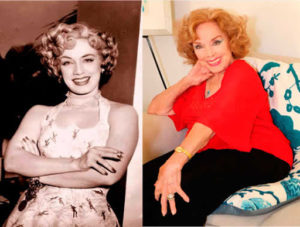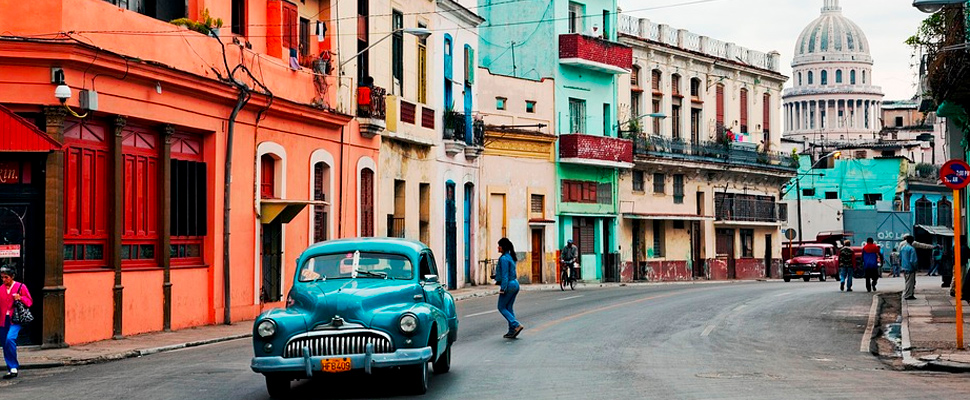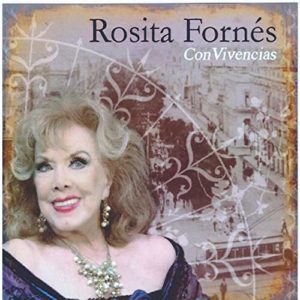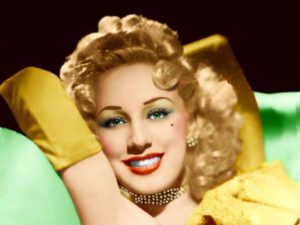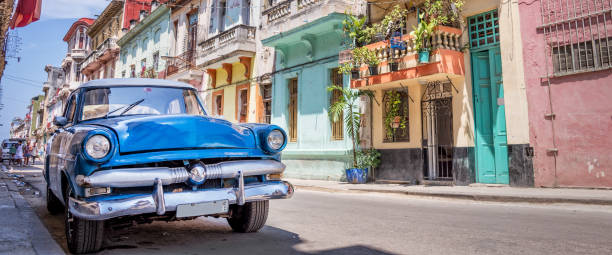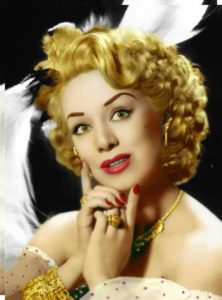 ROSITA FORNÉS, LEGENDARIA ACTRIZ, CANTANTE Y VEDETTE CUBANA. VIDEOS.
ROSITA FORNÉS, LEGENDARIA ACTRIZ, CANTANTE Y VEDETTE CUBANA. VIDEOS.
Con la muerte de Rosita Fornes desaparece la memoria viva de una época de esplendor en el mundo escénico, el teatro de variedades y el cine en Iberoamérica, y una figura admirada popularmente en Cuba por más de siete décadas de quehacer artístico. Una legendaria actriz, cantante y vedette cubana que trabajo en el Cine, Teatro, Radio, Television y Cabarets falleció en la madrugada de el miercoles 10 de Junio de 2020 en Miami, a los 97 años. Venia de visita a menudo a Miami donde reside su unica hija y otros familiares.
Rosalia Lourdes Palet Bonavia mas conocida en el mundo artistico como Rosita Fornés nació un 11 de Febrero de 1923 en Nueva York y fue una cantante y actriz de cine cubanoamericana.
Sus padres que eran inmigrantes de España al divorciarse y su madre volver a casarse cuando Rosita era apenas cinco años optaron por mudarse a Cuba. Ella tomó el nombre de su padrastro (José Fornés Dolz). Cuando tenía diez años, la familia se mudó a España, donde vivieron durante tres años antes de regresar a Cuba.
Fornés hizo su debut en el escenario en 1938, cuando apareció en el programa musical aficionado la “Corte Suprema del Arte” que buscaba nuevas estrellas en diversos generos.
https://youtu.be/ay4U1Ku-wjY
Más tarde tomó clases de música, baile y actuación con renombrados maestros de la época y continuó participando –como aficionada– en programas de radio y giras nacionales. Su primer escenario importante fue el Teatro Nacional (hoy Sala García Lorca del Gran Teatro de La Habana), donde participó en un montaje de la opereta cubana Cecilia Valdés, del compositor Gonzalo Roig.
En el Nacional hará también hará su primera actuación profesional, contratada por el empresario artístico Heliodoro García, quien también la ficha para actuar en el cabaret Sans Souci, donde se presentó durante seis meses.
Su debut cinematográfico lo haría en 1939 en el filme ‘Una aventura peligrosa’, de de Ramón Peón, unos de los pioneros del cine cubano en la etapa republicana.
Posteriormente apareció en dos películas cubanas antes de mudarse a México, donde protagonizó varias películas durante la Edad de Oro del cine mexicano. Estos incluyen “El Deseo”, “Del can-can al mambo”, “Cara sucia” y “Se acabaron las mujeres”.
En 1941, a los 18 años de edad, debutó en el Teatro Principal de la Comedia con la opereta El asombro de Damasco, y conoció a Ernesto Lecuona, quien la invitaría a participar en su compañía lírica. De su mano intervendría en numerosas zarzuelas y shows artísticos.
Paralelamente a su labor teatral y musical, en el Teatro Principal de la Comedia, el Campoamor o el Teatro Martí y con las compañías de Palacios, Lecuona, Rodrigo Prats o Miguel de Grandy, continuó siempre presentándose en las principales emisoras de la radio cubana (CMQ, COCO o en RHC Cadena Azul) y rodando varias películas.
Más tarde actuó también en obras dramáticas y comedias musicales, incluidas las dos primeras obras cubanas del género: Vivimos hoy y Hotel Tropical (de Olga de Blanck) en el Teatro Auditórium.
En 1945, a los 22 años, ya había hecho buena parte de su carrera triunfal en la isla y decidió viajar a México y Estados Unidos, donde actuó en varias películas y revistas musicales.
En 1947 se casó con el actor y empresario mexicano Manuel Medel, padre de su única hija, Rosa María, nacida el 10 de marzo de 1949.
En la década del 50 fundó con su marido, la Compañía de Teatro lírico Medel-Fornés, pero en febrero de 1952, en medio de desavenencias matrimoniales, regresó definitivamente a Cuba junto a su hija.
Enseguida la llamarían para enrolarla en la naciente televisión cubana. Su debut televisivo lo hizo en el espacio Gran Teatro Esso en CMQ-TV con la opereta La casta Susana, bajo la dirección musical de Gonzalo Roíg. Allí conoce a Armando Bianchi, con quien terminará casada, hasta que en 1981, el actor fallece ahogado en el mar.
En la Televisión Cubana, Rosita logró consolidar su brillante carrera interpretando dramas, revistas musicales, operetas, zarzuelas, comedias y un amplio repertorio de canciones. Durante largas temporadas protagonizó espacios fijos, otras veces tuvo apariciones esporádicas, pero siempre contó con el beneplácito de la teleaudiencia, que la consideraba ya la mejor vedette de Cuba.
En esta etapa creó su propia compañía de operetas, estrenó show en Tropicana, intervino en cuatro coproducciones con los estudios fílmicos mexicanos, realizó temporadas de vodevil, hizo giras internacionales y grabó sus primeros long play.
El triunfo de la Revolución la sorprende en España, con gira y contrato y planes de actuación en Argentina, pero en febrero de 1959 decide regresar a Cuba, donde retoma sus presentaciones en televisión, teatros y cabarets.
Sorprende la increíble versatilidad que le permitió a Fonés adaptarse al nuevo mundo musical y escénico de los 60. Si antes la superdiva había triunfado cantando Siboney, La Violetera, boleros inolvidables o los grandes éxitos del teatro lírico, en los primeros 60 triunfó también con ‘La chica yeyé’ o una versión del famoso tema de Procol Harum ‘Los Debiles Colores Palidos”.
Rosita Fornés tuvo que arreglárselas para sobrevivir y triunfar en un mundo que era justo lo contrario de aquel que las había aupado al éxito televisivo, y cuyos valores parecían ya carne de censura.
En la primavera de 1976 -después de 16 años de ausencia- regresó a México, donde era venerada, junto a varios de sus contemporáneos, como la imagen de una Cuba elegante, artísticamente versátil y cosmopolita.
En 1984, resultó un acontecimiento popular su aparición en la comedia de Juan Carlos Tabío ‘Se permuta’, realizada por el Instituto Cubano del Arte e Industria Cinematográficos (ICAIC). Fue su retorno al cine luego de permanecer vetada por el zar el ICAIC, Alfredo Guevara, quien consideraba que el “mundo de las lentejuelas” era un lastre del pasado y relegaba a Fornés por haber participado en un cine nacional previo al triunfo revolucionario de 1959.
La salida de Guevara del ICAIC, en 1982, propició el retorno de Fornés a la gran pantalla, con la anuencia del nuevo presidente del ICAIC, Julio García Espinosa, quien era un profundo conocedor del mundo del espectáculo y la música popular cubana.
Los noventa fueron sus años del recuerdo: regresó a los escenarios de España y de Miami, para triunfar como antaño. En 1996 se le realiza su primer documental biográfico Rosita Fornés, ‘Mis tres vidas’, producción de José A. Jiménez bajo la dirección del periodista y realizador Luis O. Deulofeu.
Muchos agradecen a Rosita su decisión de proteger en su penhouse del barrio de Nuevo Vedado a personas que eran acosadas y perseguidas por su condición de homosexuales. Su casa estuvo abierta para recibirlos en medio de una oleada represiva que laceró definitivamente al mundo teatral cubano durante la llamada “parametración”.
Fue una de las fundadoras del grupo Teatro Lírico Nacional y saltó desde los principales cabarets cubanos (muchos cerrados por las nuevas leyes revolucionarias) a las giras por el campo socialista: encabezó la producción musical “Variedades de La Habana”, que se presentó en la Unión Soviética, Hungría, Bulgaria y Rumania; participó en el Festival Internacional de la Canción de Varadero en 1967, 1970 y 1981; asistió al Festival de Sopot (en Polonia) o representó a Cuba la gira musical “Melodías de los Países Amigos”, que recorrió durante tres meses los países de Europa. Ese mismo año, participó como promotora del disco cubano en el Festival Orfeo de Oro (Bulgaria).
En febrero de 2011, don Juan Carlos I, Rey de España, le concedió la Orden del Mérito Civil.
Fornés fue elogiada por ser uno de los pioneros de la televisión cubana. Su versatilidad significaba que podía actuar en varias áreas de la industria del entretenimiento cubano. Estos incluían cine, teatro, radio, televisión y cabaret. Ella dio su actuación final en 2019, un año antes de su muerte. Tuvo lugar en un concierto homenaje a Meme Solis celebrado en el Auditorio del Condado de Miami-Dade, Florida en Estados Unidos.
El primer matrimonio de Fornés fue con Manuel Medel. Residieron en México y tuvieron una hija juntos, Rosa María. Regresó a La Habana en 1952 después de que se divorciaron. Posteriormente se casó con Armando Bianchi. Se mudaron a España, donde trabajaron para el Teatro Cómico de Barcelona, el Teatro de Madrid y el Teatro Alcázar desde 1957 hasta 1959, antes de que Bianchi muriera al ahogarse en el mar en 1981.
Fornés murió el 10 de junio de 2020 a las 4.07 a.m. en un hospital en el área metropolitana de Miami. Tenía 97 años y había sufrido complicaciones por enfisema.
En la ciudad de Miami le sobreviven su única hija, la actriz Rosa María Medel; su yerno, el productor José Antonio Jiménez y varios nietos. Para todos ellos, y para sus innumerables admiradores, vaya nuestro más profundo pésame.
Sus restos fueron llevados a Cuba para ser enterrados en el Cementerio de Colon, en la Habana.
Una aventura peligrosa (1939)
Romance musical (1941)
Los comandos de carne (1948)
El deseo (1948)
Del can-can al mambo (1951)
Mujeres del teatro (1951)
El mariachi desconocido (1953)
Se Permuta (1984)
Plácido (1986)
Papeles Secundarios (1989)
Quiéreme y verás (1994)
Las noches de Constantinopla (2001)
A lo largo de su carrera recibió numerosos honores y reconocimientos, desde el Girasol de la Popularidad de la revista Opina hasta la Orden Félix Varela, el Premio del Gran Teatro de La Habana (1988) y los premios nacionales de Teatro (2001), Televisión (2003) y Música (2005).
 ROSITA FORNÉS, CUBAN LEGENDARY ACTRESS, SINGER AND VEDETTE. VIDEOS.
ROSITA FORNÉS, CUBAN LEGENDARY ACTRESS, SINGER AND VEDETTE. VIDEOS.
With the death of Rosita Fornés, the living memory of a time of splendor in the stage world, the variety theater, and cinema in Ibero-America disappear, and a figure popularly admired in Cuba for more than seven decades of artistic endeavor. A legendary Cuban actress, singer, and star who worked in the Movies, Theater, Radio, Television, and Cabarets died in the early hours of Wednesday, June 10, 2020, in Miami, at the age of 97. She often visited Miami where her only daughter and other relatives reside.
Rosalia Lourdes Palet Bonavia better was known in the artistic world as Rosita Fornés was born on February 11, 1923, in New York and was a Cuban American film actress and singer.
Her parents who were immigrants from Spain when they divorced and her mother remarried when Rosita was just five years old chose to move to Cuba. She took the name of her stepfather (José Fornés Dolz). When he was ten years old, the family moved to Spain, where they lived for three years before returning to Cuba.
Fornés made her stage debut in 1938 when the “Supreme Court of Art” appeared in the amateur music program seeking new stars in various genres.
Later she took music, dance, and acting classes with renowned teachers of the time and continued to participate – as an amateur – in radio programs and national tours. Her first important stage was the National Theater (today the García Lorca Hall of the Great Theater of Havana), where she participated in a staging of the Cuban operetta Cecilia Valdés, by the composer Gonzalo Roig.
At the Nacional, she will also do her first professional performance, hired by the artistic businessman Heliodoro García, who also signed her to perform at the Sans Souci cabaret, where she performed for six months.
Her film debut would be in 1939 in the film ‘A dangerous adventure’, by Ramón Peón, one of the pioneers of Cuban cinema in the Republican era.
She subsequently appeared in two Cuban films before moving to Mexico, where she starred in several films during the Golden Age of Mexican cinema. These include “The Wish”, “From the can-can to the mambo”, “Dirty Face” and “The women are over”.
In 1941, at the age of 18, she made her debut in the Teatro Principal de la Comedia with the operetta The astonishment of Damascus, and she met Ernesto Lecuona, who would invite her to participate in his lyrical company. From her hand, she would take part in numerous operettas and artistic shows.
Parallel to his theatrical and musical work, at the Teatro Principal de la Comedia, the Campoamor or the Martí Theater and with the companies of Palacios, Lecuona, Rodrigo Prats or Miguel de Grandy, he continued to appear on the main Cuban radio stations ( CMQ, COCO or RHC Cadena Azul) and filming several films.
Later, she also acted in dramatic plays and musicals, including the first two Cuban plays of the genre: We Live Today and Hotel Tropical (by Olga de Blanck) at the Theater Auditorium.
In 1945, at the age of 22, she had already made a good part of her triumphant career on the island and decided to travel to Mexico and the United States, where she acted in several movies and music magazines.
In 1947 she married the Mexican actor and businessman Manuel Medel, father of her only daughter, Rosa María, born on March 10, 1949.
In the 1950s she founded the Medel-Fornés Lyrical Theater Company with her husband, but in February 1952, amid marital disagreements, she returned definitively to Cuba with her daughter.
They would immediately call her to enroll her on the nascent Cuban television. She made her television debut in the Gran Teatro Esso space on CMQ-TV with the operetta ‘La casta Susana’, under the musical direction of Gonzalo Roíg. There she meets Armando Bianchi, with whom she will end up married until, in 1981, the actor dies drowned in the sea.
On Cuban Television, Rosita managed to consolidate her brilliant career by interpreting dramas, music magazines, operettas, operettas, comedies, and a wide repertoire of songs. During long seasons she starred in fixed spaces, other times she had sporadic appearances, but she always had the approval of the tele-audience, who already considered her the best vedette in Cuba.
At this stage, she created her own operetta company, premiered a show in Tropicana, intervened in four co-productions with Mexican film studios, performed vaudeville seasons, toured internationally and recorded her first long plays.
The triumph of the Revolution surprises her in Spain, with tour and contract and action plans in Argentina, but in February 1959 she decides to return to Cuba, where she resumes her appearances on television, theaters, and cabarets.
The incredible versatility that allowed Fonés to adapt to the new musical and scenic world of the 60s is surprising. If before, the super diva had triumphed singing Siboney, La Violetera, unforgettable boleros, or the great successes of lyrical theater, in the first 60s it also triumphed with ‘ La chica yeyé ‘or a version of the famous Procol Harum song’ Los Debiles Colores Palidos “.
Rosita Fornés had to manage to survive and succeed in a world that was just the opposite of the one that had boosted them to television success, and whose values already seemed to be the meat of censorship.
In the spring of 1976 -after 16 years of absence- she returned to Mexico, where she was venerated, along with several of her contemporaries, as the image of an elegant, artistically versatile and cosmopolitan Cuba.
In 1984, her appearance in the Juan Carlos Tabío comedy ‘Permuta’, performed by the Cuban Institute of Cinematographic Art and Industry (ICAIC), was a popular event. It was her return to the cinema after being banned by the ICAIC tsar, Alfredo Guevara, who considered the “world of sequins” to be a drag on the past and relegated Fornés for having participated in a national cinema prior to the revolutionary triumph of 1959.
Guevara’s departure from ICAIC, in 1982, led Fornés to return to the big screen, with the consent of the new ICAIC president, Julio García Espinosa, who was a profound connoisseur of the world of Cuban entertainment and popular music.
The nineties were her memory years: she returned to the stages of Spain and Miami, to succeed as before. In 1996, she made her first biographical documentary Rosita Fornés, ‘My three lives’, produced by José A. Jiménez under the direction of the journalist and director Luis O. Deulofeu.
Many thank Rosita for her decision to protect people who were harassed and persecuted for being gay in her penthouse in the Nuevo Vedado neighborhood. Their house was open to receive them in the midst of a repressive wave that definitively lashed out at the Cuban theater world during the so-called “parametration”.
She was one of the founders of the group Teatro Lírico Nacional and jumped from the main Cuban cabarets (many closed by the new revolutionary laws) to tours of the socialist camp: she led the musical production “Variedades de La Habana”, which was presented at the Soviet Union, Hungary, Bulgaria, and Romania; participated in the Varadero International Song Festival in 1967, 1970 and 1981; She attended the Sopot Festival (in Poland) or represented Cuba on the musical tour “Melodies of the Friendly Countries”, which toured the countries of Europe for three months. That same year, she participated as a promoter of the Cuban album in the Orfeo de Oro Festival (Bulgaria).
In February 2011, Don Juan Carlos I, King of Spain, granted him the Order of Civil Merit.
Fornés was praised for being one of the pioneers of Cuban television. Her versatility meant that she could perform in various areas of the Cuban entertainment industry. This included Cinema, theater, radio, television, and cabaret. She gave her final performance in 2019, a year before her death. It took place at a tribute concert to Meme Solis held at the Miami-Dade County Auditorium, Florida in the United States.
Fornés’ first marriage was with Manuel Medel. They resided in Mexico and had a daughter together, Rosa María. She returned to Havana in 1952 after they divorced. Later she married Armando Bianchi. They moved to Spain, where they worked for the Barcelona Comedy Theater, the Madrid Theater, and the Alcázar Theater from 1957 to 1959 before Bianchi died drowning in the sea in 1981.
Fornés died on June 10, 2020, at 4.07 a.m. at a hospital in the Miami metropolitan area. She was 97 years old and had suffered complications from emphysema.
In the city of Miami she is survived by her only daughter, the actress Rosa María Medel; her son-in-law, producer José Antonio Jiménez and several grandchildren. To all of them, and to their countless admirers, our deepest condolences.
Her remains were brought to Cuba to be buried in the Colon Cemetery, in Havana.
(READ ROSITA FORNES DISCOGRAPHY AND AWARDS IN THE SPANISH SECTION ABOVE)
Agencies/ Wiki/ CiberCuba/ Carlos Cabrera/ Internet Photos/ YouTube/ Arnoldo Varona/ www.TheCubanHistory.com
THE CUBAN HISTORY, HOLLYWOOD.



